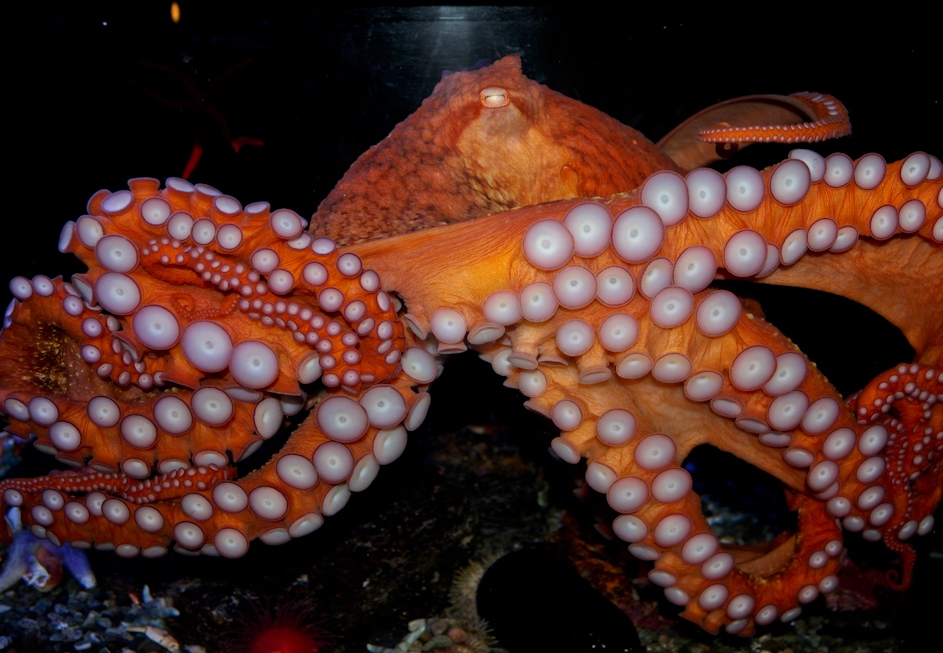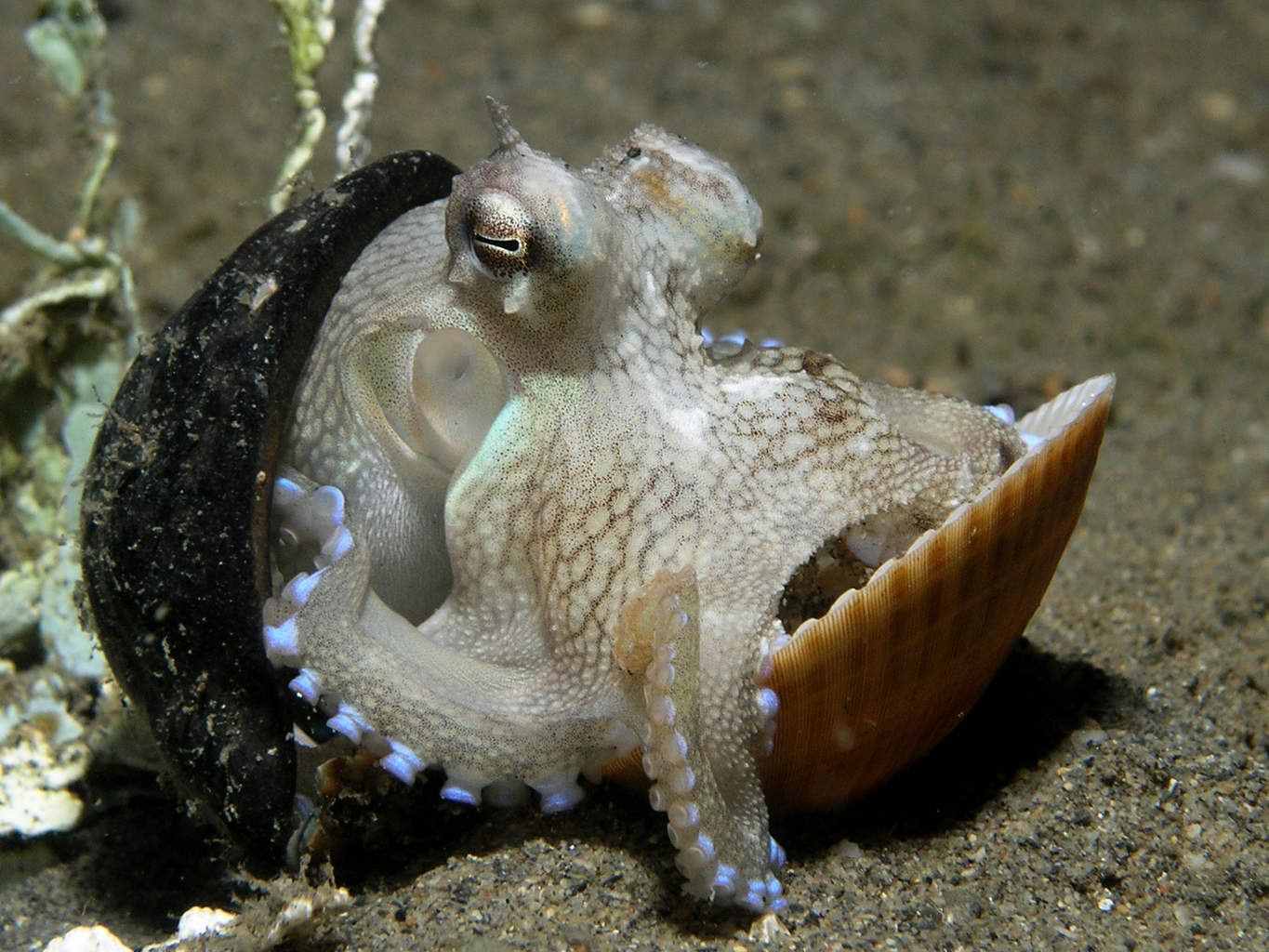Unraveling the Mystery: The Secret Life of Octopuses
In the vast and enigmatic world that is our ocean, there lurks a creature so sophisticated in intellect and so peculiar in appearance that it has captured the imaginations of humans for centuries: the octopus. This eight-armed marvel is not merely a wonder of evolution; it exhibits behaviors that challenge our understanding of intelligence in the animal kingdom.
Octopuses are part of the class Cephalopoda, which also includes squid, cuttlefish, and nautiluses. They are mollusks, a diverse group that also contains snails and clams. However, unlike their shelled relatives, most octopuses have almost completely soft bodies. This malleability allows them to squeeze through incredibly tight spaces, making them Houdinis of the sea.
## An Intellectual Powerhouse Beneath the Waves
Scientists have long been fascinated by the cognitive abilities displayed by these creatures. Octopuses possess an impressive brain-to-body ratio, one of the largest among invertebrates. Much of their nervous system is spread out within their eight arms, which can independently taste and touch. They possess hundreds of suckers on each arm, each one having the ability to feel and manipulate objects, contributing to an impressive skill set that includes opening jars and solving complex puzzles.
But what makes the octopus truly distinct is its remarkable capacity for problem-solving and learning. Octopuses have been observed using tools, a behavior once attributed only to humans and a limited number of other animals. Instances of octopuses collecting coconut shells and using them as portable shelters have demonstrated their ability to plan and use tools effectively - a clear indication of their advanced cognitive abilities.
## Masters of Camouflage
The octopus's intelligence is matched by its incredible ability for camouflage. Unlike chameleons, which change color to communicate, octopuses adapt their skin to blend into their surroundings, a mechanism used to hide from predators or to ambush prey. They achieve this via specialized skin cells known as chromatophores, which expand and contract to change the color and pattern of their skin in real-time. Beneath the chromatophores, layers of reflecting cells can alter the skin's reflectivity and iridescence, adding to the complexity of their disguise.
## Social Solitaries?
Interestingly, while the octopus is seen as a solitary creature, recent research suggests that they might have more complex social interactions than previously thought. Diver observations and underwater videos have shown interactions that hint at social behaviors, including signaling with body postures and changes in coloration. This finding is reshaping the way scientists view the social dynamics of octopuses and could open a new chapter in understanding cephalopod behavior.
## Conservation Concerns
Despite their fascinating nature, octopuses face numerous threats from human activities. Overfishing, habitat destruction, and climate change are taking an undeniable toll on their populations. It is paramount that we increase our efforts toward understanding these cephalopods, as this knowledge can be instrumental in their conservation.
The depth of the ocean matches the depth of mystery surrounding the octopus, but each discovery we make possibly brings us closer to understanding these complex and intelligent beings. In a world that is increasingly looking towards artificial intelligence for inspiration, perhaps the octopus, with its distributed nervous system and problem-solving acumen, can provide a biological blueprint for innovation.
As researchers continue to delve into the secret life of octopuses, we are continually reminded of the incredible tapestry of life forms sharing this planet with us. Every encounter with an octopus provides another piece of the puzzle, helping us to assemble a more complete picture of these enigmatic creatures.
In exploring the secret life of the octopus, we not only uncover the mysteries of a uniquely adapted animal but also gain insights into the broader workings of cognition in nature. They are not just animals to be marveled at, but also subjects from which to learn, as their alien-like intelligence operates in ways that are both foreign and fascinating to us.
The journey into the mind of the octopus is just beginning, and with each dip beneath the waves, we are likely to find more surprises waiting for us. The puzzle of the octopus's secretive existence raises profound questions about the nature of intelligence, the evolution of complex behavior, and the intricate web of life that exists beneath the ocean's surface.
Stay tuned as we continue to explore these themes, and much more, in the next segment of this dive into the secret life of octopuses.## Exploring Octopus Intelligence: Beyond the Brain
As we delve deeper into the sophisticated world of octopus intelligence, it becomes clear that these creatures offer a different paradigm for understanding cognition. With a decentralized nervous system—an incredible network that extends beyond the brain and into each arm—octopuses challenge traditional views on the centralization of intelligence.
This alien-like nervous arrangement allows for a remarkable level of autonomy. Each arm of an octopus operates semi-independently, managing basic tasks without direct input from the brain. This means that if an octopus loses an arm, not only can the arm continue to react to stimuli for a period of time, but the octopus can also adapt and learn to function without it, displaying an incredible capacity for bodily changes.
## Emotional Creatures?
Another fascinating aspect of these creatures is the suggestion of an emotional life. Some researchers have posited that octopuses exhibit behaviors that could be likened to play —a trait typically associated with more 'advanced' animals like mammals and birds. Observations have shown octopuses repeatedly blowing jets of water at objects, seemingly for no other reason than the sheer enjoyment of it.
While interpreting these actions as 'play' is still controversial in scientific circles, the possibility opens up a new realm for considering subjective experiences in invertebrates. If octopuses can experience something akin to enjoyment or boredom, this has profound implications for how we view the emotional capacities of non-human animals.
## Extraordinary Abilities and Adaptations
Amazingly, the octopus not only adapts its skin for camouflage but also changes its body texture to mimic the three-dimensional aspects of its surroundings, an ability exhibited by few other species. Adding to their list of talents, certain species of octopuses have displayed mimicry skills, with the aptly named mimic octopus able to imitate the physical likeness and movements of more than 15 different species, including sea snakes, lionfish, and flatfish.
This level of mimicry is not just a physical feat but an intelligent calculation involving observation, processing, and execution—further evidence of their problem-solving prowess. It also leads to questions about the octopus's understanding of other species in its environment and its strategic decision-making process.
## The Enigma of Octopus Reproduction and Lifecycle
The lifecycle of an octopus brings its own set of mysteries. Octopuses typically lead a solitary life until they reach the time to mate. What is fascinating—and somewhat tragic—about their reproductive process is the fact that it signals the beginning of the end of their lives. After mating, males will die within a few months, whereas females lay their eggs and vigilantly guard them until they hatch, after which they too will pass away.
This lifecycle, known as semelparity, in which an organism reproduces once and then dies, raises interesting questions about the evolution of such a strategy in such intelligent creatures. The care octopus mothers provide for their offspring—forsaking food to guard the eggs against predators—speaks to a level of parental investment that seems incongruous with their otherwise solitary existence.
## Conservation: A Shared Responsibility
Their unique reproductive strategy, combined with other threats, means that octopus populations are particularly vulnerable. Sustainable fishing practices and marine conservation are crucial in ensuring that octopuses do not vanish from our oceans. Protecting their habitats and understanding their lifecycles is vital for their conservation.
The fascination with octopuses goes beyond their intriguing behaviors; it reflects a greater narrative of our relationship with the natural world. It is a reminder that intelligence comes in many forms and that the survival of such incredible species rests in the balance of our actions.
The octopus, with its remarkable abilities and alien anatomy, remains one of the most captivating subjects of marine research. Their existence challenges our assumptions about intelligence and consciousness and continues to inspire awe and curiosity. As we continue to explore the depths and shallows where they reside, we can only hope to protect these awe-inspiring creatures for future generations to admire and understand.
In the end, the secret life of octopuses is more than a biological curiosity—it is a reflection of life's vast potential and the myriad ways it can manifest. As we peel back the layers of mystery surrounding these tentacled beings, we uncover not only the secrets of their world but also the infinite possibilities of life itself. The study of octopuses is a journey that transcends science and invites us into a world of wonder—reminding us all of the beauty and complexity that lie beneath the ocean's surface.





Comments